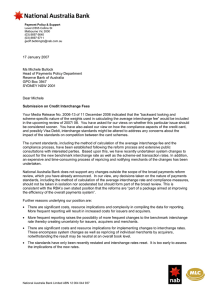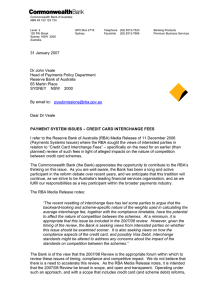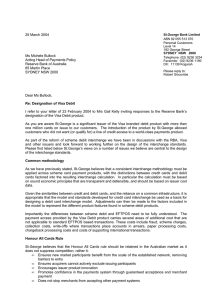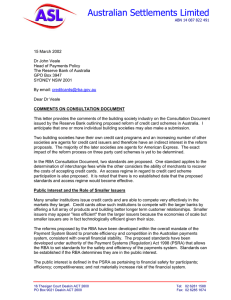N A B D
advertisement
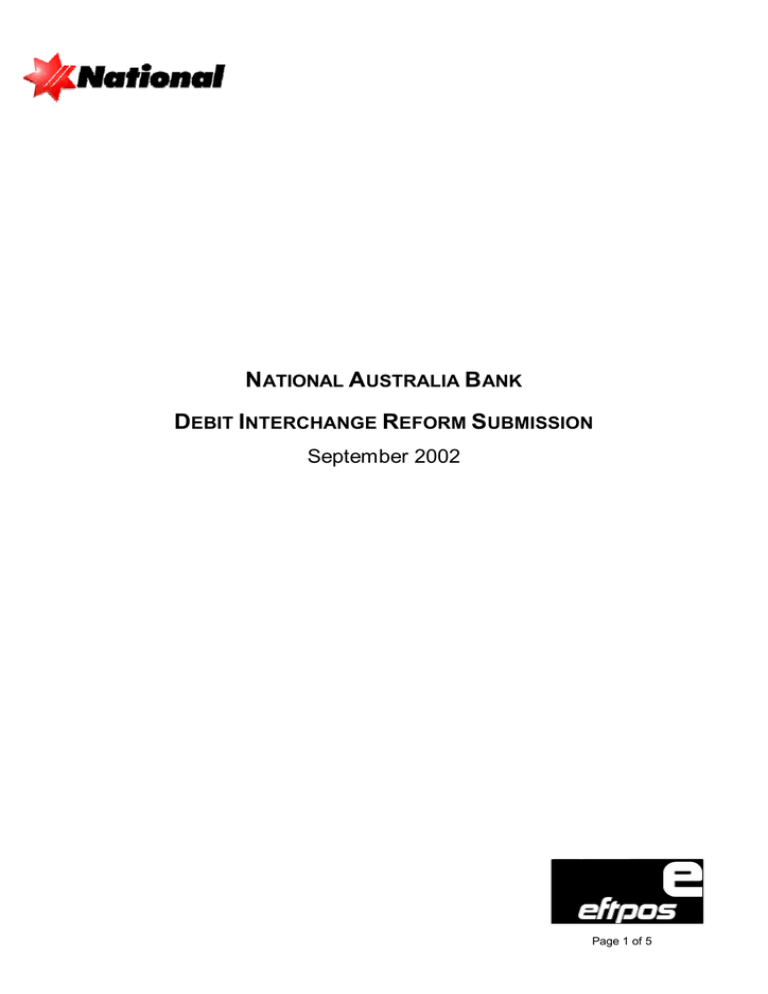
NATIONAL AUSTRALIA BANK DEBIT INTERCHANGE REFORM SUBMISSION September 2002 Page 1 of 5 NATIONAL AUSTRALIA B ANK - DEBIT INTERCHANGE REFORM SUBMISSION Sep 02 1. Introduction The National fully supports the need for reform of debit card interchange and has been an active participant in the Eftpos Industry Working Group (EIWG) formed at the behest of the Reserve Bank of Australia (RBA). We believe that the objective of this reform should be to achieve a simpler more efficient and transparent pricing regime. We agree with the view expressed by the RBA and Australian Competition and Consumer Commission (ACCC) in their paper A Study of Interchange Fees and Access (“the Joint Study”) that the debit card network in Australia no longer needs an interchange fee. Furthermore we have always been of the opinion that there should be simultaneous credit card and debit card reform. This submission set out the background to the reform process, the options for reform and our views on it in more detail together with their rationale. It is made on the basis that credit reform occurs as per the access regime and standards issued by the RBA. The National reserves its position in relation to making further submissions on various matters raised both in this submission itself, and in general in relation to the overall progress of the RBA’s program of regulation. 2. Reform Process Background On February 19th 2002 the Reserve Bank of Australia convened a meeting of financial and selected other institutions that were major participants in the debit card network. At that meeting the RBA questioned participants that “whether an interchange fee is needed at all, given that some successful Eftpos systems, such as those in Canada and the Netherlands, operate without an interchange fee”1. All participants2 at the meeting advised that they were committed to the reform even though there were diverse points of view. When asked when would the RBA step in and designate the RBA advised “that as long as the intentions remained positive as to the progression of an industry solution, the Bank would be happy to continue along this path”1. They further added “that the Bank would have preferred a voluntary solution to the credit card issues, but the Payment Systems Board does not have infinite patience”1. At a subsequent meeting on the 8th of April the EIWG agreed to develop an options paper that proposed models for interchange reform. Shortly after this meeting Coles Myer was invited to join the EIWG because they were a “merchant principal” on Consumer Electronic Clearing Stream, which is responsible for the rules governing 1 Minutes of EFTPOS Interchange Fee Arrangements, 19 February 2002 drafted by the RBA 2 CBA, St George Bank, BankWest, CUSCAL, Cashcard, ANZ Bank, Westpac, ASL, Bank of Qld, National Australia Bank Page 2 of 5 NATIONAL AUSTRALIA B ANK - DEBIT INTERCHANGE REFORM SUBMISSION Sep 02 settlement and clearing of debit cards, among other things, within the Australian Payments Clearing Association Limited. An options paper for Eftpos interchange reform has now been developed and has been provided to key stakeholders3 for comment and have invited submissions in return from them. The EIWG has agreed that there will be an open and transparent decision process for the selection of an option to move forward on and that stakeholders will be actively engaged. The first step of this engagement process is a workshop with stakeholders, which is planned to take place shortly. 3. Options Developed The interchange reform options set out in the EIWG Options paper are: • Modification of existing bilateral arrangements utilising an initial circuit breaker followed by adopting a more long-term reform approach. • Adoption of a multilateral interchange fee in one of two flavours: − − A standardised fee adopted by all industry participants in either their contracts or via network rules. A default multilateral rate with the ability to negotiate bilateral arrangements. • Elimination of interchange fees altogether. For the multilateral interchange the paper describes three fee-pricing options. These options together with the interchange flow that results and their rationale are set out in the diagram below. Multilateral Interchange Pricing Options Pricing Method Issuer Issuer Only Only Costs Costs Fee Fee Pricing Pricing Options Options Acquirer Acquirer Only Only Costs Costs Net Net Issuer/ Issuer/ Acquirer Acquirer Costs Costs Interchange Flow Rationale Acquirer pays issuer • Acquirers & merchants receive benefits from issuers • Benefits far outweigh those provided by acquirers to cardholders & issuers • Costs more easily recouped from merchants than cardholders • Consistent with credit cards Issuer pays acquirer • Cardholders receive a benefit - access to their funds - withdraw cash • Costs largely borne by acquirers and merchants • Costs more easily recouped from direct cardholders' fees than from merchants Zero interchange or small flow to issuers or to acquirers • Both cardholders and merchants receive benefits roughly proportional to net costs • Excess amount of overall costs borne by issuing or acquiring side passed to other • Consistent with a “user pays” model The options paper primarily concentrated on interchange but made the following observations with respect to access. 3 Australian Retailers Association, COSBOA, Australian Institute of Petroleum, Lowes, Woolworths, Australian Consumers Association, Financial Services Consumer Policy Centre Page 3 of 5 NATIONAL AUSTRALIA B ANK - DEBIT INTERCHANGE REFORM SUBMISSION Sep 02 • Interchange reform options that move toward a more uniform and transparent interchange fee regime could help to address access concerns. • Further analysis may be needed to determine if other steps can be taken, outside of (or in addition to) interchange fee reforms, to enhance Eftpos network accessibility. 4. Reform Views and Rationale Interchange In Australia, interchange in debit transactions flows the opposite to other countries in the world. The reason for this was to incentivate acquirers to invest in the infrastructure to allow electronic point of sale transactions. As these networks are now established it is now appropriate that the basis upon which that interchange is calculated be revisited. It is within this context the National agrees with the RBA/ ACCC “Joint Study” view of being no need for debit card interchange. The RBA/ACCC rationale for no interchange is: • A debit card is simply a method of accessing a transaction account and it is an alternative to cheques, direct debits and direct credits which access the same account and have no interchange. With these other payment instruments issuers recover their costs through transaction fees. • Debit cards issuers can already recover their costs from their own customers. • Debit card usage has thrived in other countries where no interchange fees exist. Debit card interchange fees in Australia, which flow from issuer to acquirer, are unique. • The absence of interchange fee revenues for issuers has not constrained the issuance of debit cards on the contrary the use of debit cards has grown strongly. • The application of the other pricing models for multilateral interchange does not provide a convincing argument. The most logical approach to determine interchange for debit cards is to apply the same economic principles that were used by the RBA for credit card reform. If this were so, issuer only costs such as transaction processing, authorisation, fraud and fraud prevention would be the only “eligible” costs used in calculating the interchange fee. Thus this approach would result in a small interchange rate of about $0.074 payable by the acquirer to the issuer. However the National believes that taking into account the views of the regulators and stakeholders and the desire to achieve simultaneous debit and credit reform that the only pragmatic decision that can be made is to adopt a zero interchange rate. Overall a zero interchange approach promotes efficiency, user pays principles, transparency and sends the correct price signals to both consumers and merchants. A 4 Source: Debit and Credit Card Schemes in Australia, A Study of Interchange Fees and Access, published by the Reserve Bank of Australia, Australian Competition and Consumer Commission. Page 4 of 5 NATIONAL AUSTRALIA B ANK - DEBIT INTERCHANGE REFORM SUBMISSION Sep 02 zero interchange rate is different to no interchange in that it would enable the industry to revise the interchange rate should there be changes in the underpinning economic situation or increases in “eligible” costs in the future. However the legal and implementation issues surrounding the introduction of a zero rate still need to be worked through. Simultaneous Reform The National has long stated its views on the need for simultaneous credit card and debit card reform. The two reasons for this are: • Credit cards and debit cards are substitutes for some forms of payment and that it makes eminent sense in terms of pricing signals and transparency to modify them at the same time. • It also makes practical sense to review merchants contracts that cover debit and credit once rather than twice. This is particularly important given the number of merchants and the extent to which the differing card acceptance profiles require pricing to be individually negotiated. The zero interchange approach has the advantage that it is likely to meet with less resistance from regulators and therefore has more chance of meeting our simultaneous debit and credit card reform objectives. Surcharging Some industry associations have suggested that the current flow of interchange fees allows merchants to be compensated for the services they provide cardholders and for their investment in technology. Therefore they are less supportive of the zero interchange proposal. To overcome their concerns, rather than by maintaining the current interchange flow, merchants should be allowed to recover their costs from customers directly at the point of sale via a surcharge. The RBA has already recommended such a regime of surcharging be permitted for credit cards. As with credit cards the National would not expect surcharging for debit cards to be common. Access The National supports a review of access to the system, but believes that a full review would be too complex and time consuming at this time to enable the goal of simultaneous Debit Card and Credit Card reform to occur. The National recommends that the EIWG commit to access reform as a phase two initiative after reform of debit card interchange has been resolved. Adopting a zero interchange rate should be seen as only a first step along the way to opening up access to the debit card network. Ongoing Investment Any potential new investment required in the network, such as upgrading to the Triple Data Encryption Standard would now need to be funded directly from either cardholders or merchants through transaction fees imposed by issuers and acquirers respectively. Page 5 of 5

